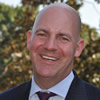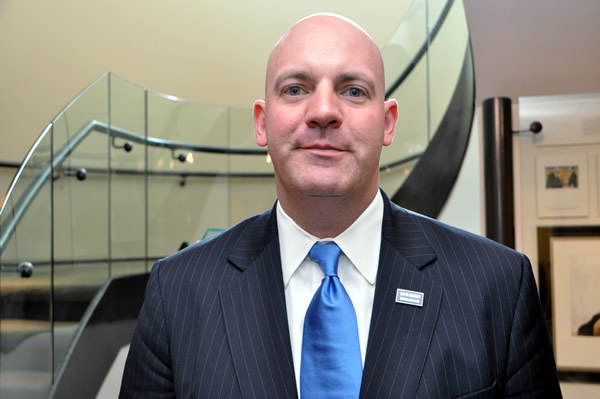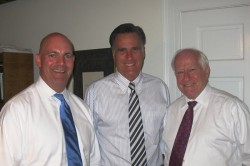National
Log Cabin issues ‘qualified endorsement’ of Romney
Move comes despite GOP support for Federal Marriage Amendment


R. Clarke Cooper, executive director of the Log Cabin Republicans (Washington Blade photo by Michael Key)
The Log Cabin Republicans announced on Tuesday morning that it’s giving a “qualified endorsement” to Republican presidential nominee Mitt Romney after months of speculation over whether the gay GOP group would back the candidate despite his anti-gay views.
R. Clarke Cooper, executive director of the organization, announced that Log Cabin’s board had elected to endorse Romney in a statement because supporting the candidate is the right decision “for our members, our community and for the nation as a whole.”
“Despite our disagreement with Gov. Romney on the issue of marriage, on balance it is clear that in today’s economic climate, concern for the future of our country must be the highest priority,” Cooper said. “We are Republicans, and we agree with Gov. Romney’s vision for America in which success is a virtue, equal opportunity is ensured, and leaders recognize that it is the American people, not government, that build our nation and fuel its prosperity. On issues of particular concern to the LGBT community, we believe Governor Romney will move the ball forward compared to past Republican presidents. No matter who is in the White House, it is crucial our community always has a credible voice speaking out on behalf of LGBT Americans. Log Cabin Republicans will be that voice to President Mitt Romney.”
Log Cabin also sent a statement to supporters via email saying the organization is giving Romney a “qualified endorsement” and the organization will “be most active” in supporting previously endorsed House and Senate candidates — such as Richard Tisei in Massachusetts and Rep. Nan Haywoth (R-N.Y.), a member of LGBT Equality Caucus — as opposed to getting more involved in the presidential election.
Cooper told the Washington Blade that Log Cabin’s 15-member board made the decision to endorse Romney earlier this month by a vote of 14-1. Cooper declined to identify the dissenting member of the board and wouldn’t immediately offer the exact date for when the board made the decision.
The endorsement for Romney comes even though Romney has signed an agreement with the anti-gay National Organization for Marriage to back a Federal Marriage Amendment to the U.S. Constitution, defend the Defense of Marriage Act in court and establish a presidential commission on religious liberty to investigate the harassment of opponents of same-sex marriage. In 2004, Log Cabin withheld the endorsement from then-President George W. Bush largely because of his support for a Federal Marriage Amendment.
Log Cabin’s email to supporters explains the decision to endorse Romney despite his decision to sign this pledge and back a Federal Marriage Amendment, saying “2012 is not 2004. The Federal Marriage Amendment has been voted on twice, and each time has failed with bipartisan opposition.”
“While even the suggestion of enshrining discrimination in our nation’s most precious document is deeply offensive, there is a significant difference between a valid threat and an empty promise made to a vocal but shrinking constituency,” the email states. “In our judgment, the NOM pledge is ultimately merely symbolic and thus should not be the basis of a decision to withhold an endorsement from an otherwise qualified candidate, particularly given the gravity of the economic and national security issues currently at stake.”
Andrea Saul, a Romney campaign spokesperson, thanked Log Cabin for its endorsement in response to an email inquiry from the Washington Blade.
“Gov. Romney is pleased to have the support of the Log Cabin Republicans and looks forward to working together for the future of our country,” Saul said.
Jamie Citron, the Obama campaign’s LGBT vote director, rebuked the gay GOP group for endorsing Romney based on the candidate’s previously articulated anti-gay positions.
“If the Log Cabin Republicans are interested in supporting a candidate who would have left ‘Don’t Ask Don’t Tell’ in place and has committed to enshrining discrimination into the constitution, then it is an endorsement that is best suited for Mitt Romney,” Citron said.
Individuals working to re-elect Obama to the White House expressed displeasure over the decision. Among them was Jerame Davis, executive director of the National Stonewall Democrats, who slammed Log Cabin for endorsing Romney and called the organization a sell-out to the LGBT community.
“The Log Cabin Republicans have proven once and for all that they are not an organization aligned with the LGBT movement,” Davis said. “They are a Republican front group bumbling their way into fooling LGBT voters that it’s OK to support a party that would legislate us back into the closet.”
Davis added that the endorsement decision was a “disgrace” and motivating factors other than Romney’s record were in play.
“This is politics at its worst — when a community sells out its own people for the gain of a few individuals,” Davis said. “There is little doubt that Clarke Coooper’s position on the RNC finance committee played a major role in this decision. Of course, so did their blinding fear of GOProud nipping at their heels.”
Previously, Cooper told the Washington Blade that Log Cabin was seeking clarity on Romney’s position on the Employment Non-Discrimination Act before making an endorsement decision and was seeking to meet with the Romney campaign about the issue. Romney supported the legislation as a U.S. Senate candidate in 1994, but has since backed away from that support and hasn’t talked about the bill during the 2012 presidential campaign. In the email to supporters explaining the endorsement, Cooper said on the issue of workplace discrimination, “we are persuaded that we can work with a Romney administration to achieve a desirable outcome.”
The “qualified” endorsement is akin to the qualified endorsement for the candidate that gay former U.S. House Rep. Jim Kolbe gave to Romney in an interview with the Washington Blade during the Republican National Convention based on the candidate’s business background despite his opposition to same-sex marriage.

Republican presidential nominee Mitt Romney (center) with Log Cabin’s R. Clarke Cooper (left) and former U.S. Rep. Jim Kolbe (photo courtesy Log Cabin)
The statement also includes a photo of Cooper with Romney and Kolbe. The file name for the photo denotes a meeting between Romney and Log Cabin on Oct. 17 in Leesburg, Va. It’s not immediately clear whether the photo was from a meeting in which Romney’s position on ENDA came up.
In the statement announcing the endorsement, Log Cabin also provided words from Rep. Ileana Ros-Lehtinen (R-Fla.), who endorsed Romney during the primary, and Ted Olson, a former U.S. solicitor general who’s leading a lawsuit against California’s Proposition 8, but helped the Romney campaign with debate prep.
Ros-Lehtinen, a supporter of marriage equality who’s known as being one of the most pro-LGBT Republican lawmakers in Congress, praised the endorsement.
“Our nation needs common sense solutions to fixing our economy and creating private sector jobs and Gov. Romney will provide us with the strong leadership we need at this critical time,” Ros-Lehtinen said. “Gov. Romney understands that businesses need less government regulation and lower taxes. Romney is the right man for our time. I am pleased that Log Cabin Republicans is endorsing Gov. Romney. I know that all of us together will fight for equality for all Americans, regardless of race, gender or sexual orientation.”
Olson emphasized that both he and Log Cabin support Romney for president and marriage equality at the same time.
“Like the Log Cabin Republicans, I am proud to support Governor Romney for president, and I am proud to be an advocate for the freedom to marry,” Cooper said. “This endorsement speaks to Log Cabin’s principled belief in equality for all Americans, and the pragmatic recognition that our nation is in need of new leadership. Getting our fiscal house in order is more than an economic imperative – it’s a moral imperative. Gay or straight, Americans deserve a president who will secure a future for our children that doesn’t leave them buried in debt.”

The Comings & Goings column is about sharing the professional successes of our community. We want to recognize those landing new jobs, new clients for their business, joining boards of organizations and other achievements. Please share your successes with us at [email protected].
Congratulations to Gil Pontes III on his recent appointment to the Financial Advisory Board for the City of Wilton Manors, Fla. Upon being appointed he said, “I’m honored to join the Financial Advisory Board for the City of Wilton Manors at such an important moment for our community. In my role as Executive Director of the NextGen Chamber of Commerce, I spend much of my time focused on economic growth, fiscal sustainability, and the long-term competitiveness of emerging business leaders. I look forward to bringing that perspective to Wilton Manors — helping ensure responsible stewardship of public resources while supporting a vibrant, inclusive local economy.”
Pontes is a nonprofit executive with years of development, operations, budget, management, and strategic planning experience in 501(c)(3), 501(c)(4), and political organizations. Pontes is currently executive director of NextGen, Chamber of Commerce. NextGen Chamber’s mission is to “empower emerging business leaders by generating insights, encouraging engagement, and nurturing leadership development to shape the future economy.” Prior to that he served as managing director of The Nora Project, and director of development also at The Nora Project. He has held a number of other positions including Major Gifts Officer, Thundermist Health Center, and has worked in both real estate and banking including as Business Solutions Adviser, Ironwood Financial. For three years he was a Selectman, Town of Berkley, Mass. In that role, he managed HR and general governance for town government. There were 200+ staff and 6,500 constituents. He balanced a $20,000,000 budget annually, established an Economic Development Committee, and hired the first town administrator.
Pontes earned his bachelor’s degree in political science from the University of Massachusetts, Dartmouth.
Kansas
ACLU sues Kansas over law invalidating trans residents’ IDs
A new Kansas bill requires transgender residents to have their driver’s licenses reflect their sex assigned at birth, invalidating current licenses.

Transgender people across Kansas received letters in the mail on Wednesday demanding the immediate surrender of their driver’s licenses following passage of one of the harshest transgender bathroom bans in the nation. Now the American Civil Liberties Union is filing a lawsuit to block the ban and protect transgender residents from what advocates describe as “sweeping” and “punitive” consequences.
Independent journalist Erin Reed broke the story Wednesday after lawmakers approved House Substitute for Senate Bill 244. In her reporting, Reed included a photo of the letter sent to transgender Kansans, requiring them to obtain a driver’s license that reflects their sex assigned at birth rather than the gender with which they identify.
According to the reporting, transgender Kansans must surrender their driver’s licenses and that their current credentials — regardless of expiration date — will be considered invalid upon the law’s publication. The move effectively nullifies previously issued identification documents, creating immediate uncertainty for those impacted.
House Substitute for Senate Bill 244 also stipulates that any transgender person caught driving without a valid license could face a class B misdemeanor, punishable by up to six months in jail and a $1,000 fine. That potential penalty adds a criminal dimension to what began as an administrative action. It also compounds the legal risks for transgender Kansans, as the state already requires county jails to house inmates according to sex assigned at birth — a policy that advocates say can place transgender detainees at heightened risk.
Beyond identification issues, SB 244 not only bans transgender people from using restrooms that match their gender identity in government buildings — including libraries, courthouses, state parks, hospitals, and interstate rest stops — with the possibility for criminal penalties, but also allows for what critics have described as a “bathroom bounty hunter” provision. The measure permits anyone who encounters a transgender person in a restroom — including potentially in private businesses — to sue them for large sums of money, dramatically expanding the scope of enforcement beyond government authorities.
The lawsuit challenging SB 244 was filed today in the District Court of Douglas County on behalf of anonymous plaintiffs Daniel Doe and Matthew Moe by the American Civil Liberties Union, the ACLU of Kansas, and Ballard Spahr LLP. The complaint argues that SB 244 violates the Kansas Constitution’s protections for personal autonomy, privacy, equality under the law, due process, and freedom of speech.
Additionally, the American Civil Liberties Union filed a temporary restraining order on behalf of the anonymous plaintiffs, arguing that the order — followed by a temporary injunction — is necessary to prevent the “irreparable harm” that would result from SB 244.
State Rep. Abi Boatman, a Wichita Democrat and the only transgender member of the Kansas Legislature, told the Kansas City Star on Wednesday that “persecution is the point.”
“This legislation is a direct attack on the dignity and humanity of transgender Kansans,” said Monica Bennett, legal director of the ACLU of Kansas. “It undermines our state’s strong constitutional protections against government overreach and persecution.”
“SB 244 is a cruel and craven threat to public safety all in the name of fostering fear, division, and paranoia,” said Harper Seldin, senior staff attorney for the ACLU’s LGBTQ & HIV Rights Project. “The invalidation of state-issued IDs threatens to out transgender people against their will every time they apply for a job, rent an apartment, or interact with police. Taken as a whole, SB 244 is a transparent attempt to deny transgender people autonomy over their own identities and push them out of public life altogether.”
“SB 244 presents a state-sanctioned attack on transgender people aimed at silencing, dehumanizing, and alienating Kansans whose gender identity does not conform to the state legislature’s preferences,” said Heather St. Clair, a Ballard Spahr litigator working on the case. “Ballard Spahr is committed to standing with the ACLU and the plaintiffs in fighting on behalf of transgender Kansans for a remedy against the injustices presented by SB 244, and is dedicated to protecting the constitutional rights jeopardized by this new law.”
National
After layoffs at Advocate, parent company acquires ‘Them’ from Conde Nast
Top editorial staff let go last week

Former staff members at the Advocate and Out magazines revealed that parent company Equalpride laid off a number of employees late last week.
Those let go included Advocate editor-in-chief Alex Cooper, Pride.com editor-in-chief Rachel Shatto, brand partnerships manager Erin Manley, community editor Marie-Adélina de la Ferriére, and Out magazine staff writers Moises Mendez and Bernardo Sim, according to a report in Hollywood Reporter.
Cooper, who joined the company in 2021, posted to social media that, “Few people have had the privilege of leading this legendary LGBTQ+ news outlet, and I’m deeply honored to have been one of them. To my team: thank you for the last four years. You’ve been the best. For those also affected today, please let me know how I can support you.”
The Advocate’s PR firm when reached by the Blade said it no longer represents the company. Emails to the Advocate went unanswered.
Equalpride on Friday announced it acquired “Them,” a digital LGBTQ outlet founded in 2017 by Conde Nast.
“Equalpride exists to elevate, celebrate and protect LGBTQ+ storytelling at scale,” Equalpride CEO Mark Berryhill said according to Hollywood Reporter. “By combining the strengths of our brands with this respected digital platform, we’re creating a unified ecosystem that delivers even more impact for our audiences, advertisers, and community partners.”
It’s not clear if “Them” staff would take over editorial responsibilities for the Advocate and Out.
-

 Federal Government4 days ago
Federal Government4 days agoTwo very different views of the State of the Union
-

 Virginia4 days ago
Virginia4 days agoVa. activists preparing campaign in support of repealing marriage amendment
-

 Opinions4 days ago
Opinions4 days agoThe global cost of Trump’s foreign aid ideology
-

 Movies3 days ago
Movies3 days agoMoving doc ‘Come See Me’ is more than Oscar worthy
















